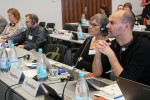CMS and OceanCare Sign Partnership Agreement

Sigrid Lüber, OceanCare President (left), Bradnee Chambers, Executive Secretary of CMS (center) and Øystein Størkersen, Chair of CMS Standing Committee during the partnership signature ceremony in Bonn, Germany © Aydin Bahramlouian
Bonn, 10 November 2016 - CMS and OceanCare signed a Partnership Agreement today to formalize their cooperation to better conserve aquatic and marine migratory species. CMS Executive Secretary, Bradnee Chambers, and OceanCare President, Sigrid Lüber, signed the agreement in the margins of the 45th Meeting of the CMS Standing Committee taking place from 9 to 10 November in Bonn, Germany.
Bradnee Chambers, the Executive Secretary of UNEP/CMS.
The partnership provides an opportunity to work together on issues such as ocean noise, marine debris and aquatic bushmeat.
OceanCare has taken the issue of anthropogenic marine noise to various Multilateral Environmental Agreements and other UN Organizations. OceanCare President Sigrid Lüber, acts in her private capacity as a Co-Chair of the Joint CMS/ACCOBAMS/ASCOBANS Noise Working Group. OceanCare also contributed substantively to the development of the CMS Family Guidelines on Environmental Impact Assessments for Marine Noise-generating Activities, which will be presented to CMS COP12 for adoption.
UNEP and some of its affiliated organizations have placed marine debris high on the political agenda. OceanCare is a partner to the Global Partnership on Marine Litter. The Parties acknowledged the importance of this global problem and, consequently, the Resolution on Management of Marine Debris was adopted by CMS COP11.
Sigrid Lüber, OceanCare President.
OceanCare is supporting the discussions on bushmeat within the CMS Scientific Council’s Aquatic Mammals Working Group and will continue to do so in the lead-up to the 2nd Meeting of the Sessional Committee of the CMS Scientific Council. In accordance with Resolution 10.15, the Working Group is providing information on the impact of aquatic bushmeat on CMS-listed species in three regions: West and Central Africa, South/Southeast Asia and Latin America. It recommends that a specific CMS Resolution be submitted to CMS COP12 on aquatic bushmeat, which would be relevant across the CMS Family.
Aquatic bushmeat is a growing threat to dolphins, small whales, turtles, manatees, polar bears and seals. It implies that animals are being hunted for food, medicine and other traditional uses, including as bait for fisheries. As the forests empty and coastal fish disappear, local communities are increasingly hunting aquatic species as a protein source.
Last updated on 24 November 2016








